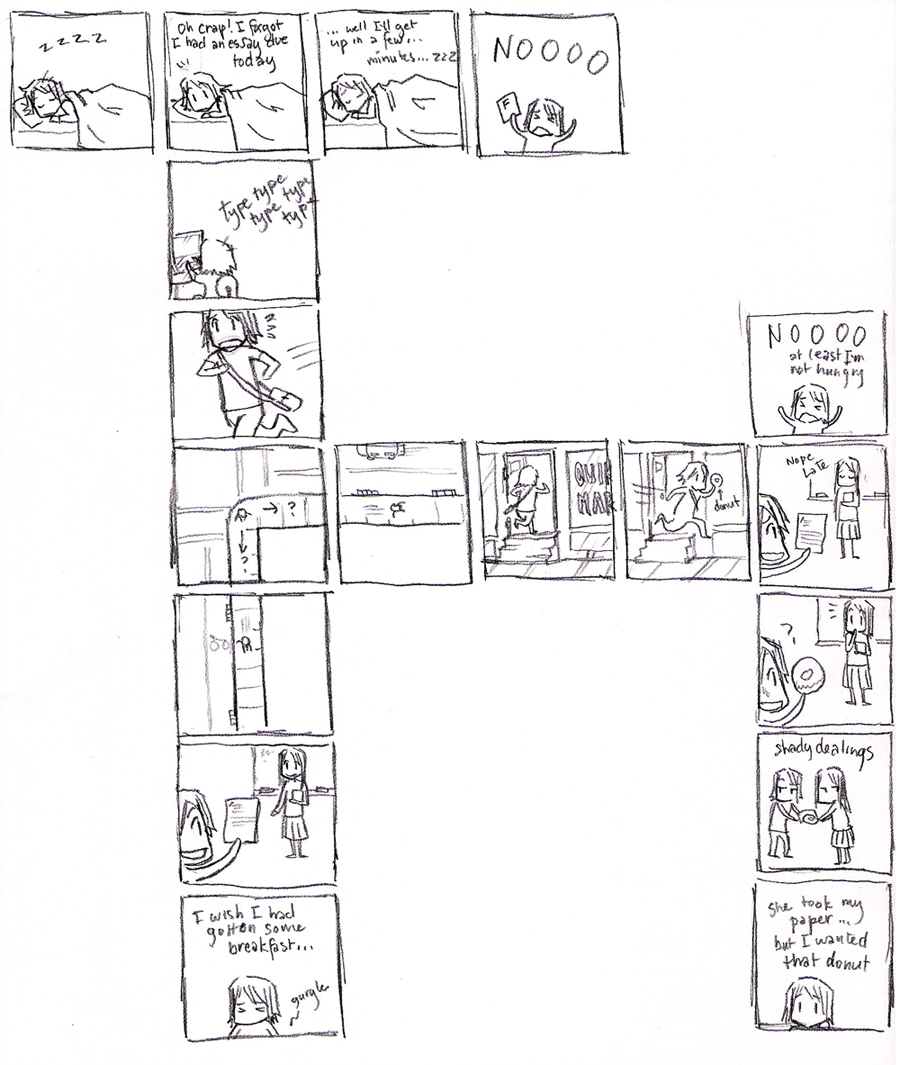What difference a day makes
April 14th, 2010I pretty much stole the idea for this comic Scott McCloud, so I’m sorry Mr. McCloud. I hope you still like me because I really like you. Thanks.
Oh, and speaking about Scott McCloud’s ideas, his infinite canvas idea is really interesting. Basically, webcomics don’t have the limits that print comics do… and there is a lot of potential play with space that can be done. A “page” from one of McCloud’s comics, Zot, really illustrate what the infinite canvas can do.
I also do not endorse bribing your TAs or professors with food.
This week we were to write on an aspect of the movie Run Lola Run.
While watching Run Lola Run, I was reminded of this XKCD comic.
Right now, I’m planning on going to school tomorrow morning, sitting through classes, doing a bit of programming work, and finishing some homework. I am a college student, and after graduation I will either go on to graduate school or dutifully join the work force and make lots of money so I can help support my parents and my younger sisters.
But today, I could also drop out of school and start attempting to make a living doing art and publishing comic books. I’d work at Rite Aid Costco Starbucks by day and commit art by night, all the while keeping an eye out for opportunities to present my portfolio. The little money I made would be spent on airplane tickets and comic convention passes (and maybe some art books and new pens and Bristol paper). Thank God for the internet, because that means I can publish stuff without spending a cent.
A drastically different life plan than the one I have now. Yet, though maybe I would entertain the idea of changing careers for a long time, it only takes a second to make the decision that would change everything.
The interesting thing about Run Lola Run was that Lola (and other characters) didn’t seem to make different decisions for each iteration consciously. After her death in her first attempt to make things right, the day started over, but she made the same decision to ask her father to help, and even ran the same course through the city (at least, that’s what it looked like to me). In other words, it didn’t seem like she had any memory of what had happened before. The different outcomes of that day seemed to come from random decisions — such as when Lola landed on top of Mr. Meyer’s car (preventing the accident and thus letting Mr. Meyer get to his meeting on time) instead of jumping over it (like she did the second time through the day). The decision to jump or to land on the car was logicless — there was no reason to do one over the other; Lola just didn’t want to get hit. Then, what is this movie saying about decisions? One of the obvious messages is that the decisions we make affect our and other people’s futures. But I think that Run Lola Run also points out that we have less control over our decisions than we might think.

 RSS
RSS






i thought this was going to be a physics joke related to ħ because it almost looks like that shape 🙁 the cafe in the physics lab building is named “ħ” (h-bar) HAHAHAHA
😀 😀 this is pretty funny. haha~
A piece reflecting on the nature of reality and choice, in the form of a fundamental physical constant with reflections on our ideas about the fundamental nature of reality. Hmm. Coincidence? On the other hand, you read XKCD…
“I am a college student, and after graduation I will either go on to graduate school or dutifully join the work force and make lots of money”
Wait, I know this one. Pick graduate school! You get to stay poor for another few years and there’s lots of hard work and pressure, but it’s also lots of fun because you’re putting all of that hard work and devotion into something that interests you greatly and you’re working with people who have similar goals and interests.
“The decision to jump or to land on the car was logicless … Then, what is this movie saying about decisions?”
From a certain perspective, yes, Lola follows a chain of cascading chance events. Remember the dominoes on the video at the beginning of iter 1 when the Japanese voice says “start”? It’s that. On the other hand, Lola does make at least one choice; in the no-place of the cartoon stair, she decides how to get past the angry dog. This in turn varies the timing of her collisions with the other lives around her: she disturbs or avoids the cart lady, she crosses before or after Mr. Meyer has pulled out, the conversation between her father and his mistress is interrupted at various stages. Then there is also Lola’s interruption of the narrative (the scream) at key points which diverts it from its current path. So there are interpretations which give a choice-focused narrative (even if one where choice is still a fragile and fleeting thing, whose consequences are far-ranging), and there are interpretations where this is all something that happens to Lola and her only choice is whether to accept or reject the ending. If you look at the narration at the beginning of the movie, this sort of complexity of interpretation is quite intentional.
Again, I greatly enjoyed reading your introductory comic strip, just to state the obvious. In relation to your analysis of the film, I was interested in your examination of Lola’s “logic-less” actions that she performed in each different storyline that produced different results. My attempted explanation of these differences relates to the elements of videogames that we were told to watch for before the film. When a gamer fails an objective (or dies), they can simply re-start the mission or begin from a previous checkpoint and try again. From this point, they will attempt to accomplish the same objectives but use different means because they failed the first time around. If we think of Lola as a videogame avatar, we can further imagine her controlling influence as either fate (represented by the falling dominoes at the beginning) or possibly a higher power (the one that she calls upon for help after failing the first time). These are simply my ideas, and support your closing idea that Run, Lola Run says more about determinism than most people initially might think.
Loved your comic strip! It really resonated with me (as it probably would with any UW student). I agree that Lola did not seem to have any recollection of previous “lives” in the film during the parts using human actors. However, this does not fit the gaming metaphor. When you play a game, die, and then go back to the beginning or a checkpoint, you remember what you did wrong the earlier try, and do something to fix it. This is where the element of time plays in. On your next life, you try to change when you go through different obstacles. I wonder if this was portrayed in the film through the cartoon bits. For example, it seemed as if after the 2nd try, Lola knew that the boy with his dog would try to trip her down the stairs, so she jumped. Perhaps the cartoon was supposed to represent more of the control that gamers have when playing with multiple lives, whereas the actual physical acting parts were meant to portray more of the “unknowns” we encounter in real life?
you really changed up the structure of the comic, i must say. Usually u’d read a comic linearly, but this has multiple outlets/results. it’s almost like a choose your own adventure story. I like it. It really shakes up the implicit understanding that the reader does not participate in the comic. Here, you don’t just follow – you get to choose.
I too thought of that xkcd. It’s interesting to think about how much free will we actually have. The decisions we make, some conscious and others not, are nevertheless confined to the linearity of a single universe, while quantum physics indicates that an infinite number of universes is possible, each branching from every possible outcome. Run Lola Run gives us a glimpse of three possible outcomes to the same initial series of events, one after the other. I’m holding out for the day when we can experience all three (and more) at once.
Once again, nice comic! Was the resemblance to h-bar intentional?
I agree that we have less control over our lives than we might think. However, I disagree with the final sentence of your post: that we have less control over our decisions than we might think. Our decisions are, in fact, the only things we have control over — we can (generally) always control our minds! However, we don’t have as much control over our *lives* because — as the rest of your blog implies — we make an overwhelming amount of choices without realizing their significance. For example, had I not chosen to enter a computer store one day and met an old friend, I might not have landed an internship out of high school followed by two more internships in the summers to come. While I was indeed seeking a job, I didn’t expect to get connected to a local Web development company, doing just the kind of work I needed on my resume! I didn’t realize the significance of the choice at the time, but now I know it was worth a lot!
Of course, that’s only part of the story — the rest is left to pure chance. We don’t always get to choose our circumstances. What if I had walked into that computer shop when my friend wasn’t working there? Or, more importantly, what if the shop was hiring, as I had originally hoped for? Rather than getting software development experience, I would’ve been working in computer retail — which doesn’t stand out much on a software engineer’s resume. Run Lola Run strongly emphasized the power of chance (especially with the roulette wheel!) in determining the outcome of our lives. While I mainly focused on this aspect in my blog, it’s interesting to read about what we can control!
The resemblance to h-bar wasn’t intentional, unfortunately! 😀 I wish it was on purpose.
@Jeff: I hadn’t even considered the roulette wheel! The stuff about chance really makes sense now. I also thought it was interesting that she bet on the square with the 20. She chose to put her life and Manni’s on 20 minutes, and all her money on that “20” roulette square. The rest was really left to luck.